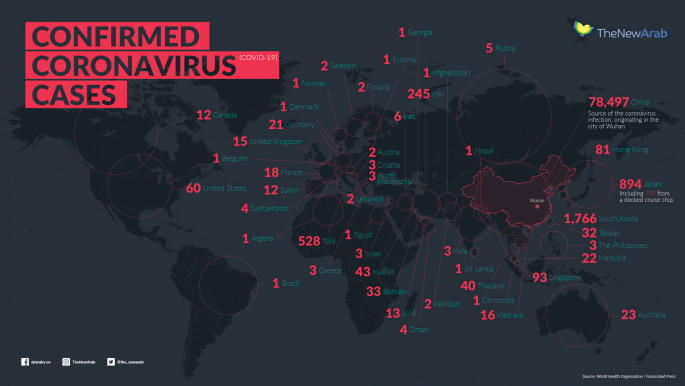Iranian MPs contract coronavirus as death toll rises to 34
Muhammad Ali Wakili, a member of Iran's Parliamentary Presidency, tweeted on Friday that the four parliamentarians were among a group of thirty deputies tested for the disease, The New Arab's Arabic-language service reported.
Head of the National Security and Parliamentary Foreign Policy Committee, Mojtaba Zonnour and a prominent reformist deputy, Mahmoud Sadiqi, confirmed their infection with coronavirus in the past days.
One of Iran's seven vice presidents, Massoumeh Ebtekar, and deputy health minister Iraj Harirchi are also among several senior officials who have been infected.
|
An additional 143 infections have been detected over the past 24 hours, raising the total number of cases to 388, health ministry spokesman Jahanpour announced on Friday.
It is the highest number of new cases for a single day since Iran announced its first confirmed infections on February 19 in the Shia shrine city of Qom.
Among the new cases, 64 were in the capital Tehran, while the number of provinces hit by the outbreak rose to 24, Jahanpour said.
Iran has the highest death toll from the virus outside China, where COVID-19 first emerged.
Jahanpour called on Iranians to stay at home, avoid unnecessary visits and cancel gatherings across the country, saying these methods are "the only solutions in controlling coronavirus in the coming weeks".
COVID-19 has spread to 23 of Iran's 31 provinces.
Must 'not gather'
In a rare move, authorities announced Thursday the cancellation of the main Friday weekly prayers in Tehran, Qom and Mashhad as well as in the capitals of 22 of Iran's 31 provinces and other infected areas.
School closures have been extended in affected areas and universities are to remain closed for another week starting from Saturday.
"All of these decisions are temporary and if the situation changes, we might intensify or ease them," Health Minister Saeed Namaki said.
On Wednesday, Iranian authorities announced domestic travel restrictions for people with confirmed or suspected infections.
They also placed curbs on access to major Shiite pilgrimage sites, including the Imam Reza shrine in second city Mashhad and the Fatima Masumeh shrine in Qom.
Visitors to the shrines will be allowed to visit on condition they are provided "with hand-washing liquids, proper (health) information, masks", Namaki said.
They must "not gather together in groups but just pray and leave", he said.
Read more: How the Middle East is dealing with coronavirus
In a message of thanks to doctors and nurses, Iran's supreme leader Ayatollah Ali Khamenei said he hoped their efforts would help "eradicate this sinister virus soon".
International health experts have expressed concern about Iran's handling of the outbreak. But Tehran insists the situation has been "improving".
 |
Follow us on Facebook, Twitter and Instagram to stay connected





 Follow the Middle East's top stories in English at The New Arab on Google News
Follow the Middle East's top stories in English at The New Arab on Google News
![The UAE is widely suspected of arming the RSF militia [Getty]](/sites/default/files/styles/image_330x185/public/2024-11/GettyImages-472529908.jpg?h=69f2b9d0&itok=Yauw3YTG)
![Netanyahu furiously denounced the ICC [Getty]](/sites/default/files/styles/image_330x185/public/2024-11/GettyImages-2169352575.jpg?h=199d8c1f&itok=-vRiruf5)
![Both Hamas and the Palestinian Authority welcomed the ICC arrest warrants [Getty]](/sites/default/files/styles/image_330x185/public/2024-11/GettyImages-2178351173.jpg?h=199d8c1f&itok=TV858iVg)